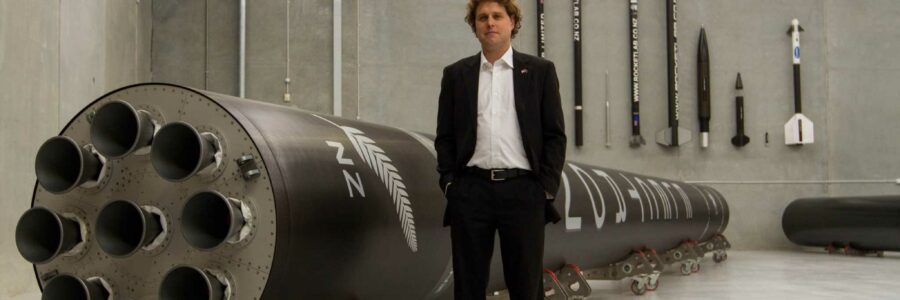
Small-launch leader Rocket Lab going public via a SPAC, with plans for bigger Neutron rocket
- Rocket Lab, the leader among companies building small rockets to launch satellites, is going public through a SPAC merger.
- The company is merging with Vector Acquisition Corp. in a deal that values Rocket Lab at a $4.1 billion enterprise valuation.
- Rocket Lab also unveiled plans for a second, larger rocket called Neutron to lift even more payloads than its current Electron rocket that has launched to orbit 18 times.
Rocket Lab, the leader among companies building small rockets to launch satellites, is going public through a SPAC merger that values the company at more than $4 billion when the deal closes.
The company is combining with Vector Acquisition, a special purpose acquisition company. Rocket Lab will list on the Nasdaq under the ticker RKLB when the deal closes, which is expected in the second quarter.
"This milestone accelerates Rocket Lab's ability to unlock the full potential of space through our launch and spacecraft platforms and catalyzes our ambition to create a new multi-billion-dollar business vertical in space applications," Rocket Lab CEO Peter Beck said in a news release.
Vector's SPAC currently trades under the ticker VACQ. Shares of the SPAC climbed more than 20% in premarket trading from its previous close of $10.25 a share.
The SPAC deal values Rocket Lab at an enterprise valuation of $4.1 billion, with the company expecting to have about $750 million in cash after the merger is complete. That cash includes up to $320 million from Vector Acquisition, as well as a $470 million PIPE round led by Vector Capital, BlackRock and Neuberger Berman, among other investors.
PIPE, or private investment in public equity, funding allows private investors to buy public shares at below-market prices. A SPAC is a special purpose acquisition company in which investors give essentially a blank check to a company for the purpose of unspecified acquisitions of other firms.
Beck will continue to lead Rocket Lab as CEO, with Vector Capital's chief investment officer Alex Slusky set to join the company's board of directors – alongside Khosla Ventures' Sven Strohband, Bessemer Venture Partner's David Cowan, DCVC's Matt Ocko, and independent director Mike Griffin.
Notably, Rocket Lab's announcement comes on the same day as satellite data venture Spire Global revealed that it too will merge with a SPAC to go public. Both Rocket Lab and Spire Global count Bessemer as an investor, with partners Cowan and Tess Hatch on the companies' respective boards.
Unveiling the bigger Neutron rocket
Rocket Lab also unveiled plans for a second, larger rocket called Neutron to lift even more payloads than its current Electron rocket. The company has launched 97 satellites on 18 Electron missions to date.
Its Electron rockets are priced at about $7 million per launch, standing at about 60 feet tall and capable of lifting as much as 300 kilograms to low Earth Orbit.
Neutron, which is expected to launch in 2024 for the first time, will stand at 131 feet tall and will be capable of carrying as much as 8,000 kilograms to low Earth orbit, the company said. Rocket Lab did not disclose how much Neutron is expected to cost per launch, noting that its first launch will require the company to build a new launchpad at NASA's Wallops flight facility in Virginia.
Rocket Lab said Neutron will have a reusable first stage, also known as the booster, which will "land on an ocean platform." The company also noted that Neutron will be capable of launching astronauts to the International Space Station, adding another capability to the company's repertoire.
Building on pole position
Founded by Beck in New Zealand in 2006, Rocket Lab is now based in Long Beach, California and has 530 employees. The company launches from a private complex on New Zealand's Mahia Peninsula, and has built a launchpad at Wallops for Electron launches.
Rocket Lab holds a strong position in the launch market next to SpaceX, with the companies currently the two leaders regularly launching privately-developed rockets to orbit.
But the launch marketplace – generally divided into the three sections of small, medium and heavy lift – is steadily growing. Rocket Lab's Electron faces rising competition from the rockets being built by those such as Astra and Virgin Orbit, while Neutron will face off with the medium lift rockets being developed by Firefly Aerospace, ABL Space, Relativity Space and more.
Beck's company has recently been testing a method of recovering its Electron boosters – the most expensive part of the rocket – to reuse them, a practice SpaceX has made routine. But unlike SpaceX, Rocket Lab has been testing a new approach given the small size of its rockets: The company uses the atmosphere to slow down the rocket, then deploys a parachute and uses a helicopter to pluck the booster from out of the sky.
Beyond Electron, the company also last year expanded its business into building spacecraft that pair with its rockets. Called Photon, Rocket Lab is building the spacecraft as a new versatile platform for companies and organizations to use to test and operate technologies in space.
Subscribe to CNBC PRO for exclusive insights and analysis, and live business day programming from around the world.
Source: Read Full Article